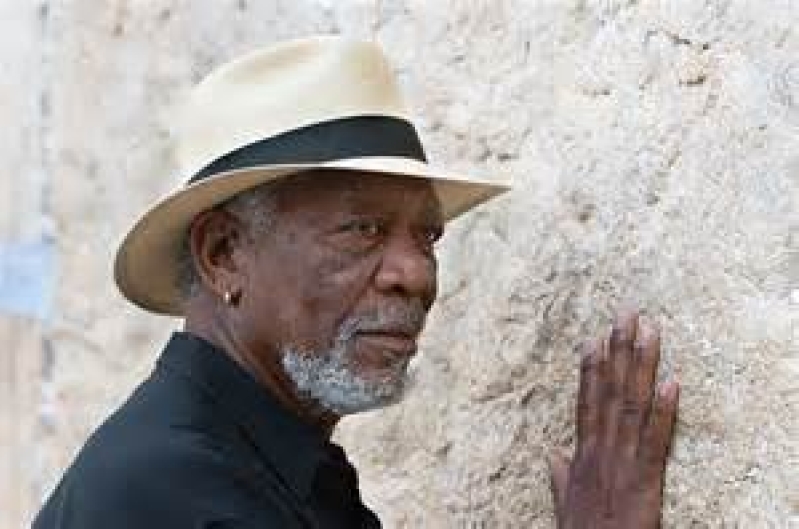
On Sunday, April 3 , the National Geographic Channel and Morgan Freeman began the journey of searching for God, more accurately, looking at the belief in God in many different religions and cultures in the show The Story of God.
In the first episode, Beyond Death, Morgan Freeman explored how the different religions in both the past and present answer the question of, "What happens when we die?" It opens with Freeman talking about growing up in Greenwood, Mississippi from the age of 7 until 18, the hurdles he crossed there- including death of his paternal grandmother and his brother, and mentions that we handle death in different ways.
"What is beyond death? How can any of us know? But some people think they do because they've been to the brink of death. Former research diver, David Bennet, is one of those people." He talks to David, who back in 1983 got caught up in a storm off the coast of California. He fell into the sea, and described his NDE of drowning and the light that he saw, and the millions of fragments of light that he saw spoke and told him that it wasn't his time. The crew that found him said that he was 15 to 18 minutes underwater without a breath of air. Morgan asks him if he believes in an afterlife, and he affirmed that he did, but that he doesn't subscribe to just one belief.
Morgan Freeman travels to Egypt to find out where the after- life came into religion. According to Daily News Egypt it was a big deal that he was there, and it was merely the fact that this is a documentary and not a movie, that the censorship of the Ministry of Culture did not apply to their scripts. Morgan Freeman and the crew were threatened with deportation if the documentary contained any material that "insults God, however. In Egypt, he speaks with an Egyptologist who explains that the pyramids were graveyards, and they were civilization's earliest signs of belief in the after-life as early as 5,000 years ago. They explore the burial chambers of King Unas and his sacred spells engraved on the walls that would help him get through the treacherous eternal journey to sit with the eternal gods in the starry heavens.
His next stop is in Mexico City, where he explores the Day of the Dead- the one night of the year where it is believed that they can spend the entire night with the souls of their ancestors. The ancestors' souls would come and spend time sharing food, jokes and stories. There is a traditional song that is sung to the souls of the ancestors to 'wake up.' Freeman explains, "The Day of the Dead developed from the Catholic faith's 'All Souls' and 'All Saints' days, but the heart of the celebration is much older. It dates back to the Aztec ideas of the afterlife. A tradition that is profoundly unChristian." He goes on to describe the human sacrifice of the Aztecs and the belief that without the sacrifice, the sun would lose its power, and all human life would come to an end.
Back to the states, Morgan Freeman's dead family members are mostly buried in cemeteries near his home, and he can visit them and reflect on their lives and his memory of them. He explains that cemeteries offer Christians a place of hope for life beyond death, and talks about the death of Jesus on the cross.
He travels to Jerusalem to study the story more deeply. He explores with an archeologist the place that enshrines the holiest of sites to Christians- the Church of the Holy Sepulchre - which enshrines what believes to be the tomb that held the body of Jesus before he was resurrected. The archeologist explains that in the Hebrew Bible, there is no reference to anyone going to heaven or hell after they die- that when you die, your body goes into an underground pit called Sheol- which is a neutral place. Morgan Freeman explains that for Christians, the death of Jesus helps to overcome the fear of death- knowing that they could live forever.
He then goes to the Hindus in India to talk about another way to overcome the fear of death- through re-incarnation and Karma. "Ultimately you don't want to be re-incarnated," it is said. Moksha (the god state) is the final goal- the end of the death and rebirth cycle.
And finally, Morgan Freeman talks about how scientists approach the after-life. The scientist that he speaks with in New York, talks about the universal experience of those who have had near-death experiences. They call the soul "consciousness" in science, and he explains that consciousness can continue, even as the body is dying. Morgan also explores how science is furthering "life after death" in the form of artificial intelligence in a current experiment, putting a real person's memories, values, and other characteristics in android.
This is the 1st episode in a six-episode series. The next episode will approach the subject of the apocalypse in various religions, and will be shown on April 10 at 9/8 central on the National Geographic Channel. Future episodes will approach "Who is God?," " Creation," and "Why Does Evil Exist?," and "Miracles."





![[Exclusive Interview] A revelation within the brink of life and death — Meg Leung’s mission in Christian art](https://www.gospelherald.com/media/cache/thumbnail/7/21/72163sp_273w_150h_1x_1y.jpg)

